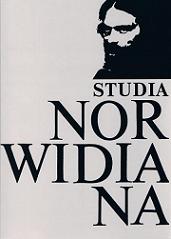Numa Łepkowski i historia nieznanej dedykacji Norwida
Numa Łepkowski and the history of Norwid's unknown dedication
Author(s): Adam CedroSubject(s): Literary Texts
Published by: Towarzystwo Naukowe KUL & Katolicki Uniwersytet Lubelski Jana Pawła II
Keywords: Norwid; Dante; Divine Comedy; United States; Numa Łepkowski; Topór coat of arms; August Antoni Jakubowski
Summary/Abstract: In 2010 in the blog nonsolusblog.wordpress.com information appeared about finding in the collection of the Illinois University Library a copy of the Italian edition of Dante’s Divine Comedy that had belonged to Cyprian Norwid. Probably Norwid had this copy in the Berlin prison, and on the basis of it he translated fragments of the Italian masterpiece. On the title page, beside the poet’s signature, there is the inscription “Florencja 1846” (Florence 1846). The date is a riddle, as in the light of the present knowledge it does not seem likely that Norwid could be in Italy in that year. The dedication in the book (“To N. Łepkowski in remembrance of 1854 in America) has made it possible to establish that its addressee, Numa Łepkowski, was born in Volhynia about 1805, he studied at the Warsaw University, and then he fought in the November Uprising. Together with a large group of Polish veterans (234 people) he was deported to the United States, among others with August Antoni Jakubowski. Until his death (28 May 1887) Łepkowski made his living by playing the guitar: he composed music, gave concerts, but first of all he taught playing this instrument in the most famous New York homes. He was also active in organizations of the Polish community in America, and he took part in the social life of the New York elites. It was probably because of his high social status and extensive relations that Norwid met him. The death of the composer and his rank as a musician was noted in obituaries in several American, and even New Zealand newspapers. Under Norwid’s signature on the title page of the book there is an imprint of a signet-ring, in which elements of the Topór coat of arms, the poet’s family sign, can be recognized. This is an additional premise that allows deciding that the book belonged to the poet’s library.
Journal: Studia Norwidiana
- Issue Year: 2011
- Issue No: 29
- Page Range: 135-156
- Page Count: 22
- Language: Polish

